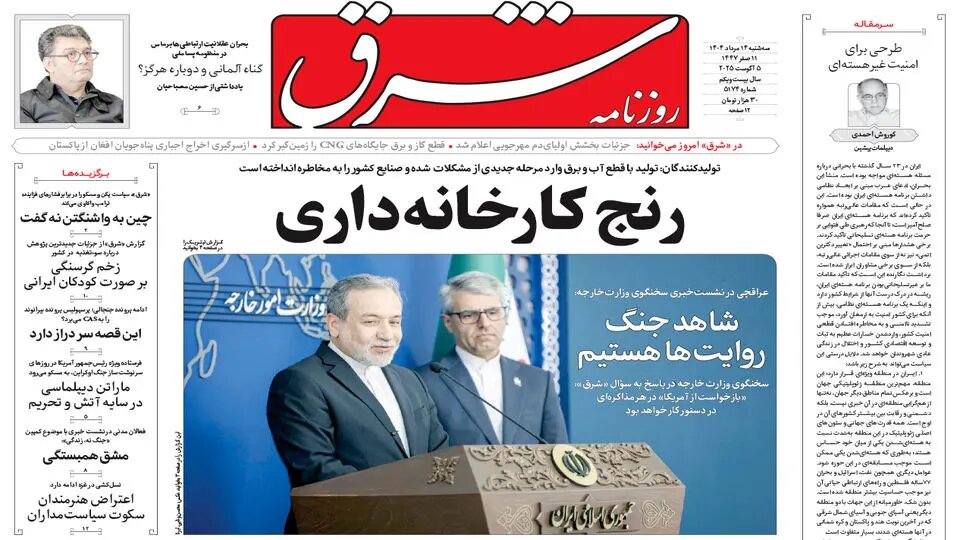A plan for non-nuclear security

TEHRAN - The Shargh newspaper examines ways to guarantee national security by adopting various strategies and approaches, such as entanglement with the international trade.
It wrote: In a situation in which the military nuclear path severely endangers national security, a non-nuclear path to ensure national security can provide deterrence, regional influence, and strengthen national defense. In military dimension, this path will include a comprehensive strategy, including conventional defense, missile and drone programs, cyber defense capabilities, strengthening counterintelligence capabilities, and defense alliances with state and non-state actors. In diplomatic dimension, it will include moving toward regional convergence, adopting confidence-building measures and a collective security structure in the Persian Gulf, rebuilding relations with Europe and Eastern allies, moving toward easing tensions with the United States and developing soft power to reduce suspicion. In the third dimension, this comprehensive strategy should emphasize lifting sanctions, strengthening domestic economic resilience, developing foreign economic relations, being involved in international production chain, playing a role in corridor diplomacy, and diversifying the economy. In the fourth and most important dimension, strengthening the relationship between the people and the political system should be the center of attention.
Sobh-e-No: Iran and Pakistan friends of difficult days
In a note, Sobh-e-No discussed Pakistan’s position in Israel’s 12-day war against Iran in June. It wrote: Pakistan’s support for Iran in the 12-day war, as well as the sharp response by Ayatollah Sayyed Hafez Riaz Hussain Najafi - chief of the Shia Educational Alliance of Pakistan - to Trump’s derogatory remarks against the Leader of the Islamic Revolution showed the extent to which the axis of resistance and Islamic unity has a place among the Pakistani people and officials, and how they consider insult to the Iranian Leader as an insult to themselves. The resolute support of such figures for Iran is a valuable capacity for the Islamic world. This trip has become a turning point in deepening unity and fraternity between the two neighboring Muslim countries. Iran and Pakistan showed that in critical moments, they do not abandon each other and consider the common concern of the Islamic world as their own. This unity and fraternity are a precious asset for both countries that can be used to secure mutual benefits and strengthen solidarity in the Islamic world. The recent visit of our President to Islamabad opened new doors for comprehensive cooperation and reminded us once again that "if we join hands, we can remove obstacles and bring honor and pride to our nations and the Islamic community."
Etemad: Tense and difficult days in negotiations
Etemad examined the recent positions of Tehran and Washington regarding Tehran’s nuclear program in an interview with Abdolreza Farajirad, a professor of geopolitics. Farajirad said: Iranian officials have taken a position against the actions of the West, and this position shows that Tehran has adopted a more decisive approach than the past and is in no hurry to resume negotiations unless Tehran’s conditions are accepted by Washington. In such circumstances, the atmosphere naturally shifts towards applying more pressure. On the other hand, Trump thinks that he can use the leverage of the Europeans to pressure Iran to come to the negotiating table even before activating the snapback mechanism. It seems that we should prepare ourselves for more difficult conditions. Maximum efforts should be made to prevent the snapback mechanism from being activated, otherwise Iran will react. In this regard, if Iran does not withdraw from the NPT, it will probably stop technical cooperation with the International Atomic Energy Agency.
Iran: Consequences of instability on the eastern borders
The Iran newspaper reported that Balochistan—Pakistan’s largest and most complex province—has long been plagued by armed conflict and persistent terrorist threats. Its significance extends beyond security concerns: Gwadar Port, a cornerstone of the China-Pakistan Economic Corridor (CPEC), is situated in this region, positioning Balochistan as a strategic nexus in the shifting geopolitical and geoeconomic landscape of South Asia and beyond. In this context, any instability within the Islamic Republic of Iran would have direct and serious repercussions for Balochistan’s security. The most immediate impact would be the erosion—or complete breakdown—of the limited cooperation between Tehran and Islamabad in counterterrorism efforts and intelligence sharing. This fragile collaboration currently plays a vital role in curbing cross-border threats. A security vacuum could emerge, providing fertile ground for extremist groups such as ISIS to expand their operations and deepen their regional influence.
Leave a Comment